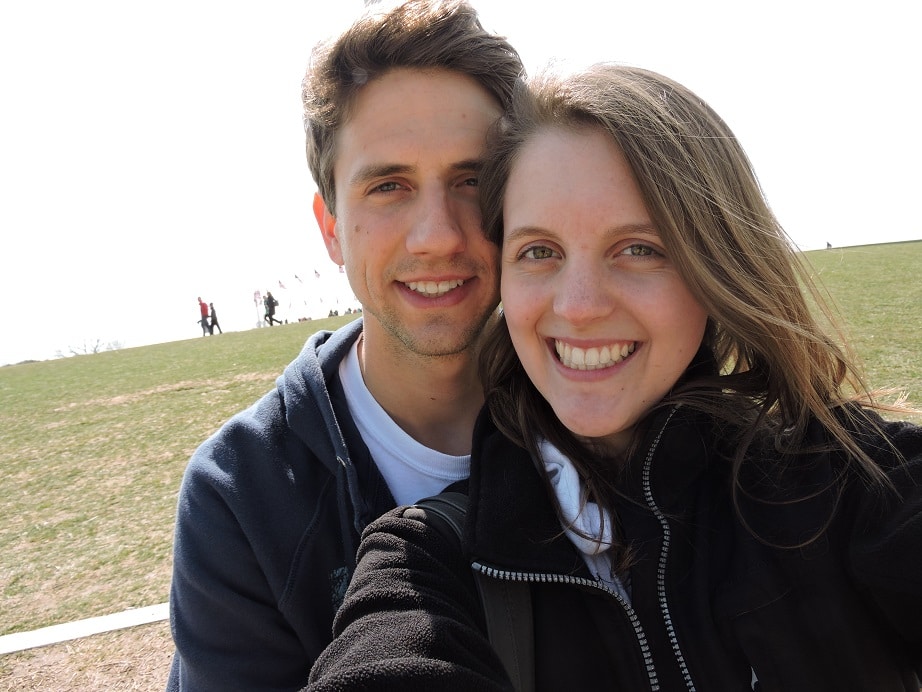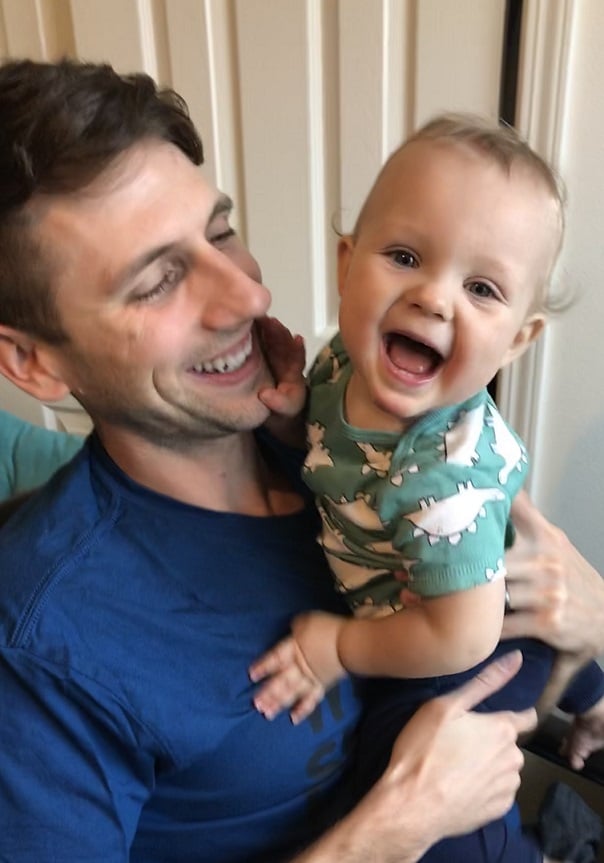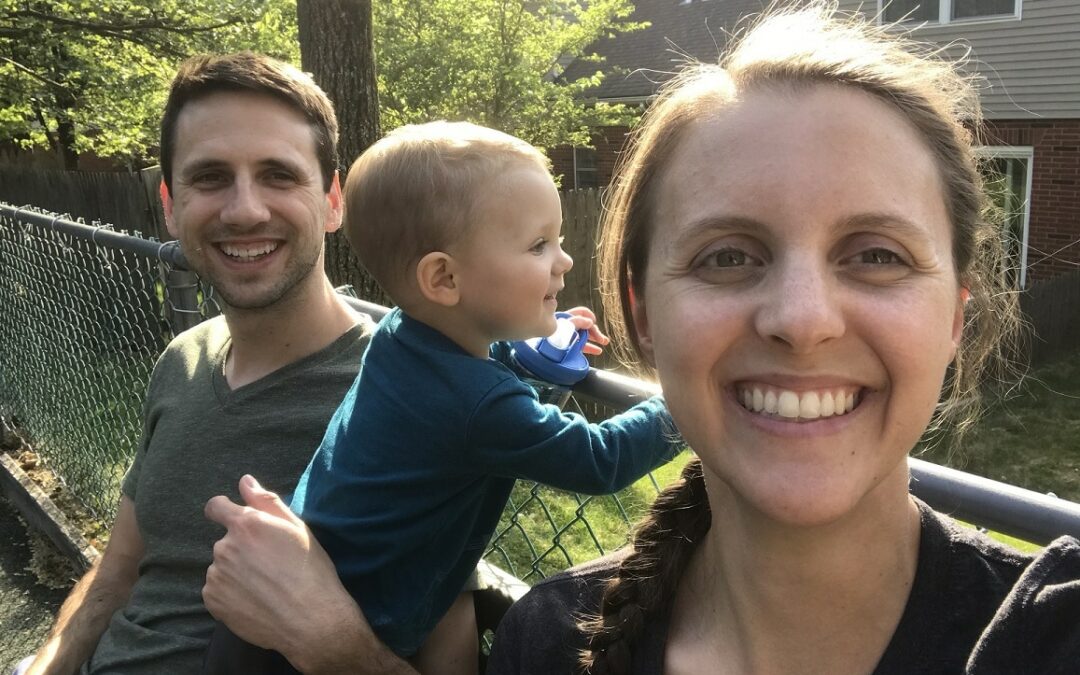By Matthew Shanks
Guest Blogger
It was a few months after finishing my master’s degree, and I was freshly out of a messy relationship, eager to find a new companion. The opportunity was ripe with the right timing, busy location, bad weather, and trending technology. Each one of those played a significant role in bringing together myself and my now-wife, Rachel.
I had just started a job in Bethesda, Maryland. It was a civilian engineering position for the Navy; however, it didn’t feel anything like the active duty world I (somewhat) now know. The possibility that I’d find myself married to a soldier definitely never crossed my mind, but you never know what a snowstorm may yield.
February 2015 brought Snowpocalypse to the DC, Maryland and Northern Virginia area… a week or so where all the singles were sitting at home, with not much to do but swipe Tinder and chat with their matches. It’s a well-populated area full of teachers, federal employees, and non-profit enthusiasts to whom the weather provided everyone interested with endless swiping. I thought my approximately 25 matches in a week showed I was at least a decent commodity, until my first date with Rachel when I discovered she had enough matches to give her a free dinner every night for over a year. Seriously, I think she had 370 matches, and had only been on the app for two weeks. Holy moly… Did she have no standards in swiping right? I guess that’s how I slipped into her matches! But she also had dozens of unread messages in her inbox, so I felt insanely lucky she even read my first message… “Hey! My roommate went to Villanova!”
From her profile, I immediately noticed she was beautiful, with a captivating smile. And simply from the handful of pictures I could tell she cared about others. I like to learn about people from their bio, but all she had on hers was “New to DC! Army nurse. Villanova grad!” and that didn’t mean much to me. Little did I know, “Army nurse” actually means quite a lot. We started chatting, and soon found ourselves falling.
The Army didn’t place any stress on our relationship at all initially. She had just started at her first duty station at Walter Reed. Not knowing if she would continue past 4 years and us not living in a military community, the only difference I noticed between her being an Army nurse, and not civilian nurse, was the uniform and unpaid overtime.
Servicemembers seeking new relationships are often presented with a huge challenge, one that Rachel and I were fortunate to avoid. If a PCS is soon approaching, the pressure to grow so rapidly can be too much on a green relationship. You don’t want to be thinking early on if a relationship is serious enough to be worth following someone. It’s simply too rushed. My wife and I were able to grow without that pressure, thankfully, and then by the time three years came around, we already knew we wanted to be together forever.



From there, our story is like many other military families — making decisions based on very limited control, and trying to make the best of things. The only thing we knew for sure was that we’d stay together. We thought perhaps she could extend a year, which would allow me to develop my career a little further before moving, but nope. Then we thought we could go to one of a few bases where I could transfer my job, but nope. We received orders for Fort Irwin, CA — in the middle of the desert with no chance of me keeping my job. We embraced it the best we could, and took it as an opportunity for me to take my part-time hobby job of coaching triathletes and racing as a professional triathlete, to be my full-time work.
That actually worked out quite well for two years, until COVID hit. At that point, we had our six-month-old son Levi. We didn’t have daycare for him anymore since I was considered a non-essential worker. It felt as if the system was laughing at me, saying, “Good luck with being the full-time caregiver while attempting to maintain your business!” The time with my son I truly appreciated, but I couldn’t do it all and my business was rapidly declining.
This was a particularly challenging time when it came to my identity. I wanted to be the provider, as the man… but I couldn’t be. I also didn’t want to be stuck to traditional gender roles, but rather do what was best for our family and also allow my wife the ability to pursue her career. Perhaps the best way I could help was simply to stay home and be the support for my wife and son. Unfortunately, due to cultural norms I felt inadequate by the thought of being the stay-at-home spouse without a career. And while trying to juggle more, I wasn’t being a great support anyway.
From the challenges I faced during the pandemic came the inspiration for an app, Kovii. Working on this new project mostly ended my mini-identity crisis, as I’m super passionate about Kovii and I don’t doubt my potential to make a positive impact on others. It hasn’t been an easy road though, and it’s only put more strain on our family. Hopefully it all works out.
I find it a little funny that my relationship with my wife started in a dating app, and now our business is the Kovii app. Tinder was about efficiency and convenience. I found my wife in a week.. that’s pretty awesome efficiency! Now I want to make it just as efficient and convenient for military spouses to connect meaningfully with those who matter, through unscheduled 1:1 calls and video calls anytime they happen to be available and in the mood to connect. Cold calling can seem intrusive and ineffective. Scheduled calls can be inconvenient and too formal — for casual connections anyway. But with Kovii, people can connect anytime they’re feeling lonely or isolated. It’s something I needed for myself, and I know others do, too. There’s no better support in life than being heard by someone who cares.
In all, I know the path my wife and I take won’t always be clear. The military will throw hurdles at us. The Kovii app will throw hurdles at us. But like all military families, we’ll do our best to be the best we can — for our own family, and to make a difference in other people’s lives, too. Like many other military spouses I never expected to be one, but it’s become a huge part of who I am because the challenges we face as a community are ones only we know.

About Matthew Shanks
Matthew is an Army husband and dad currently stationed at West Point. He has a varied background including Aerospace Engineering, coaching and racing as a professional triathlete, and now is the founder of a tech startup with the Kovii app. He’s a passionate military spouse community leader engaged with other MilSpouse entrepreneurs, military community organizations, and a new program for military spouses to meet new friends. His work focuses on finding new and effective ways to bring people together at the level of personal, individual connections.



